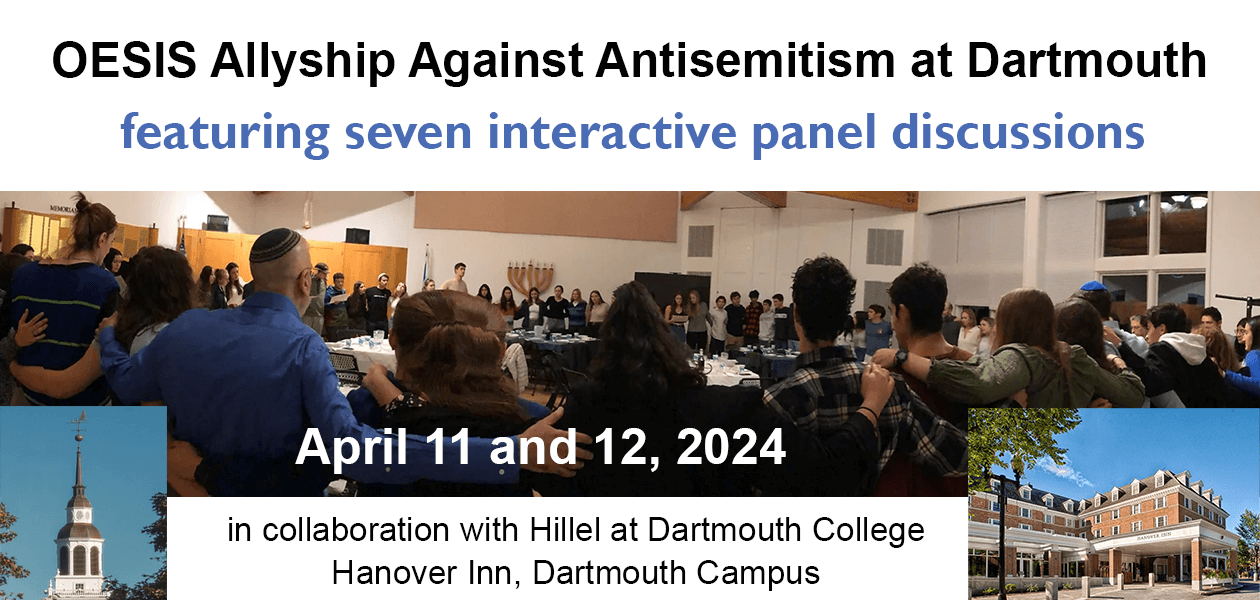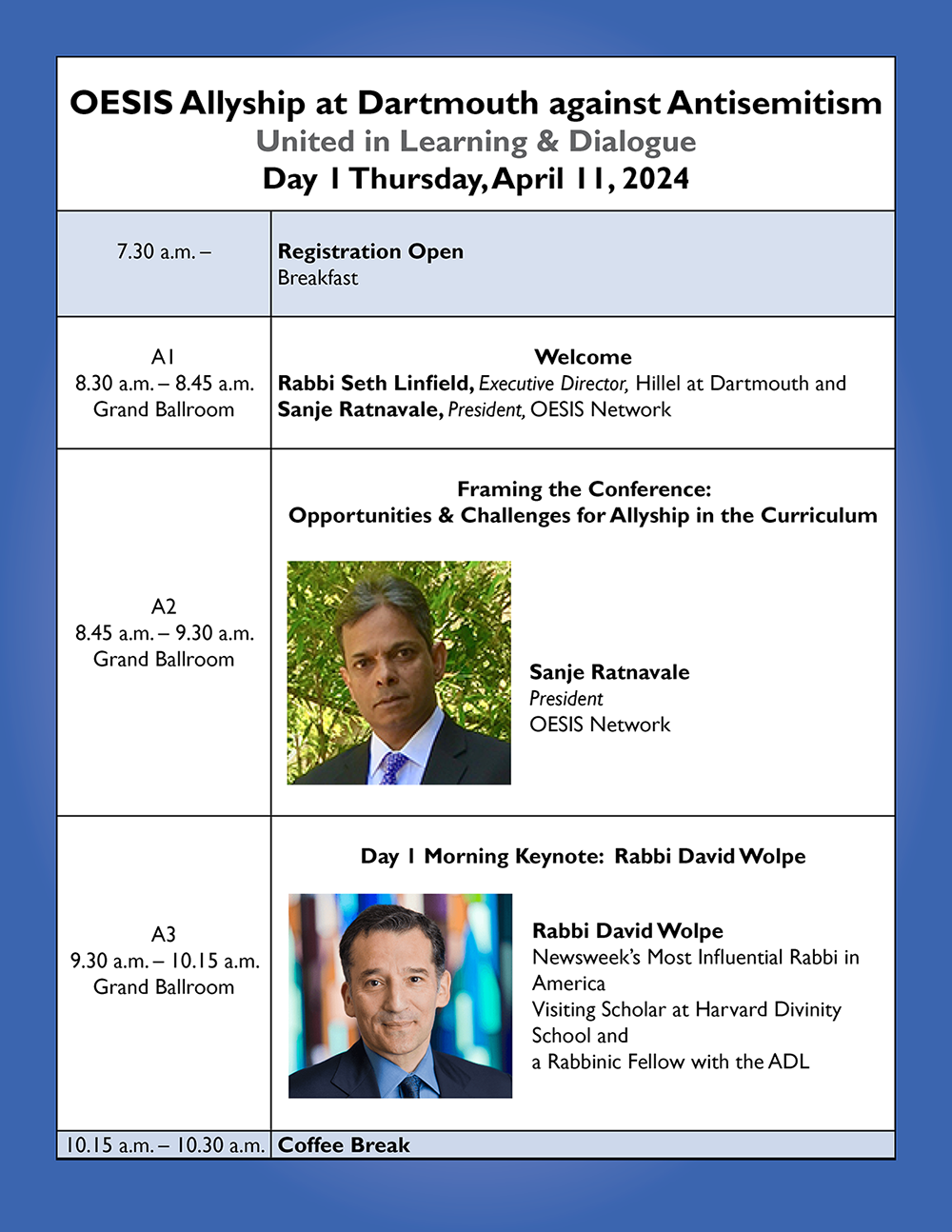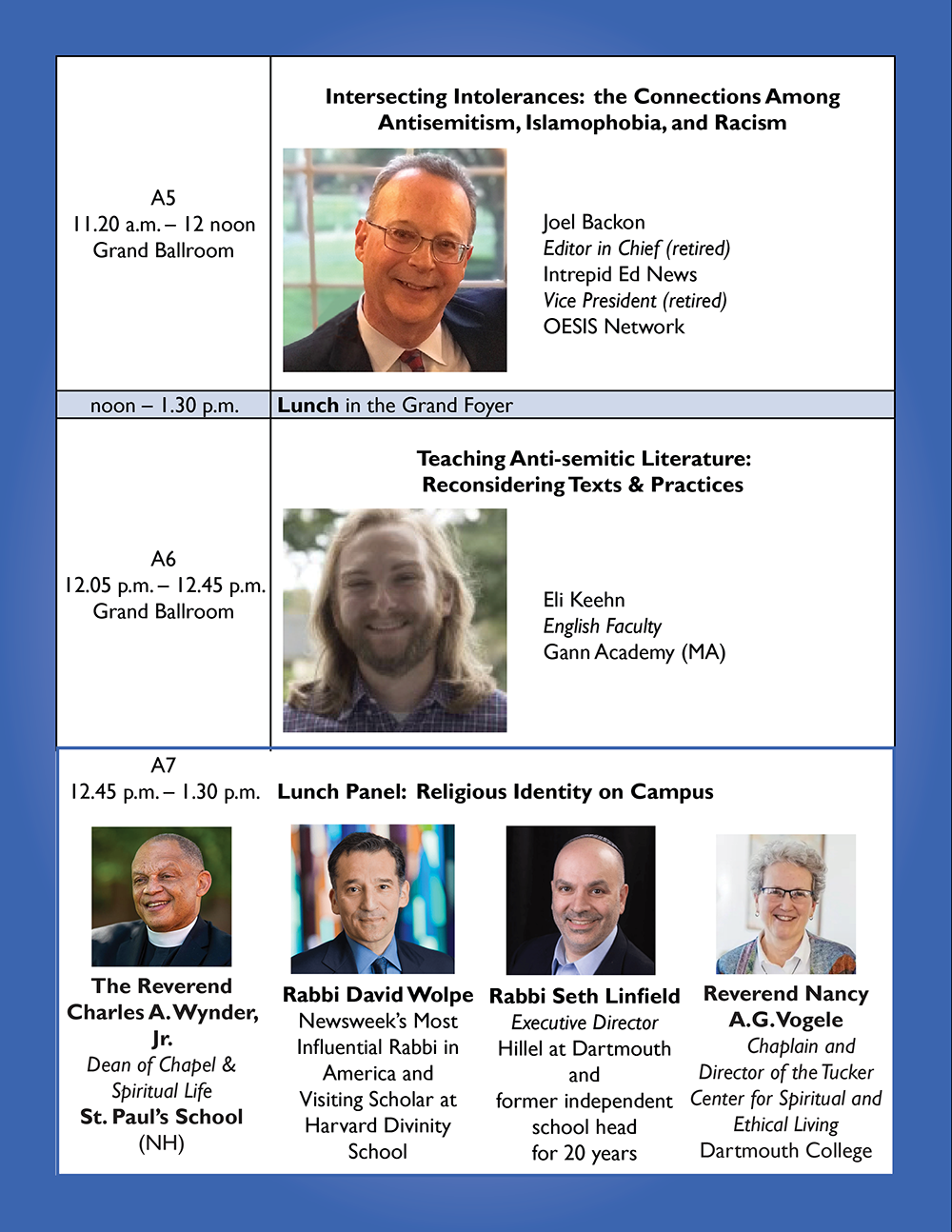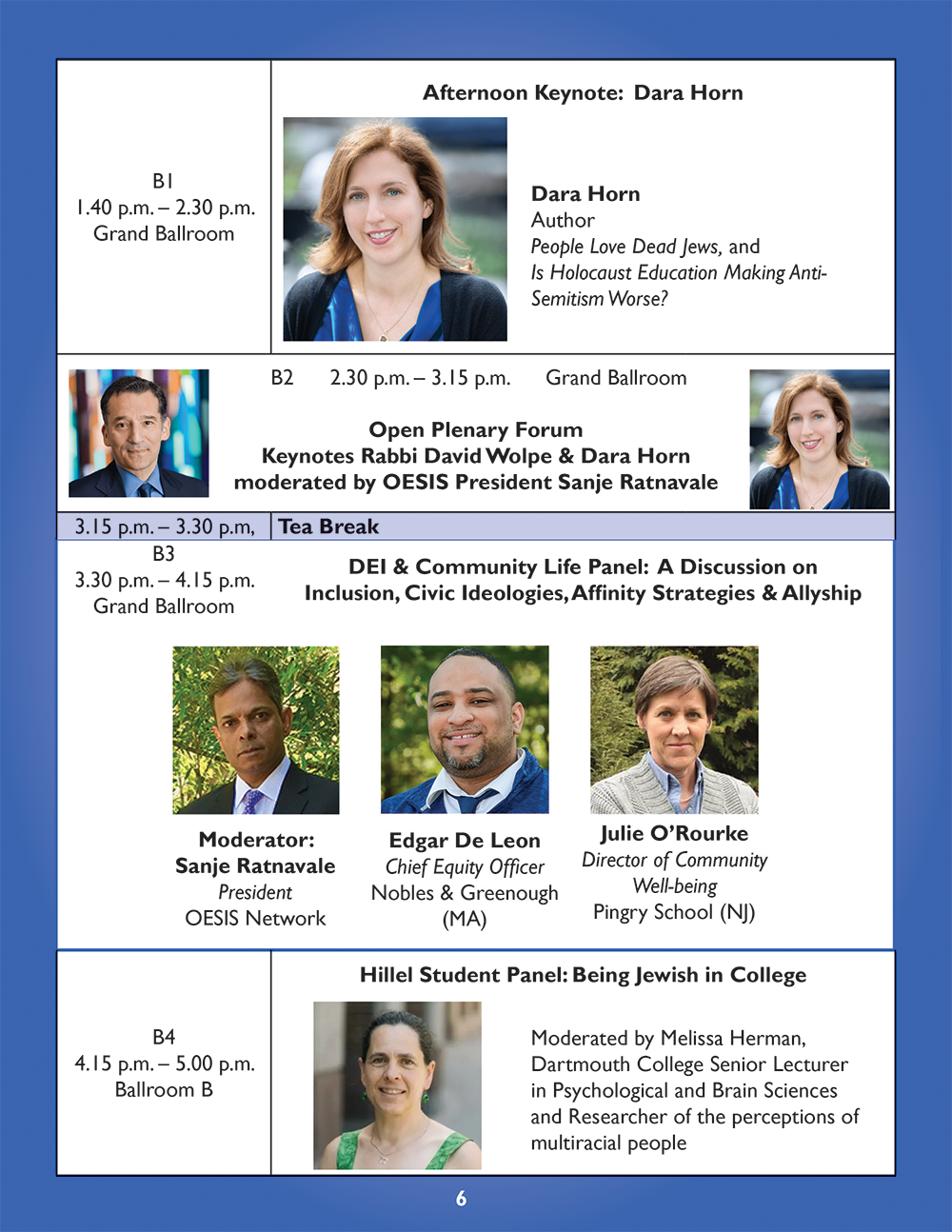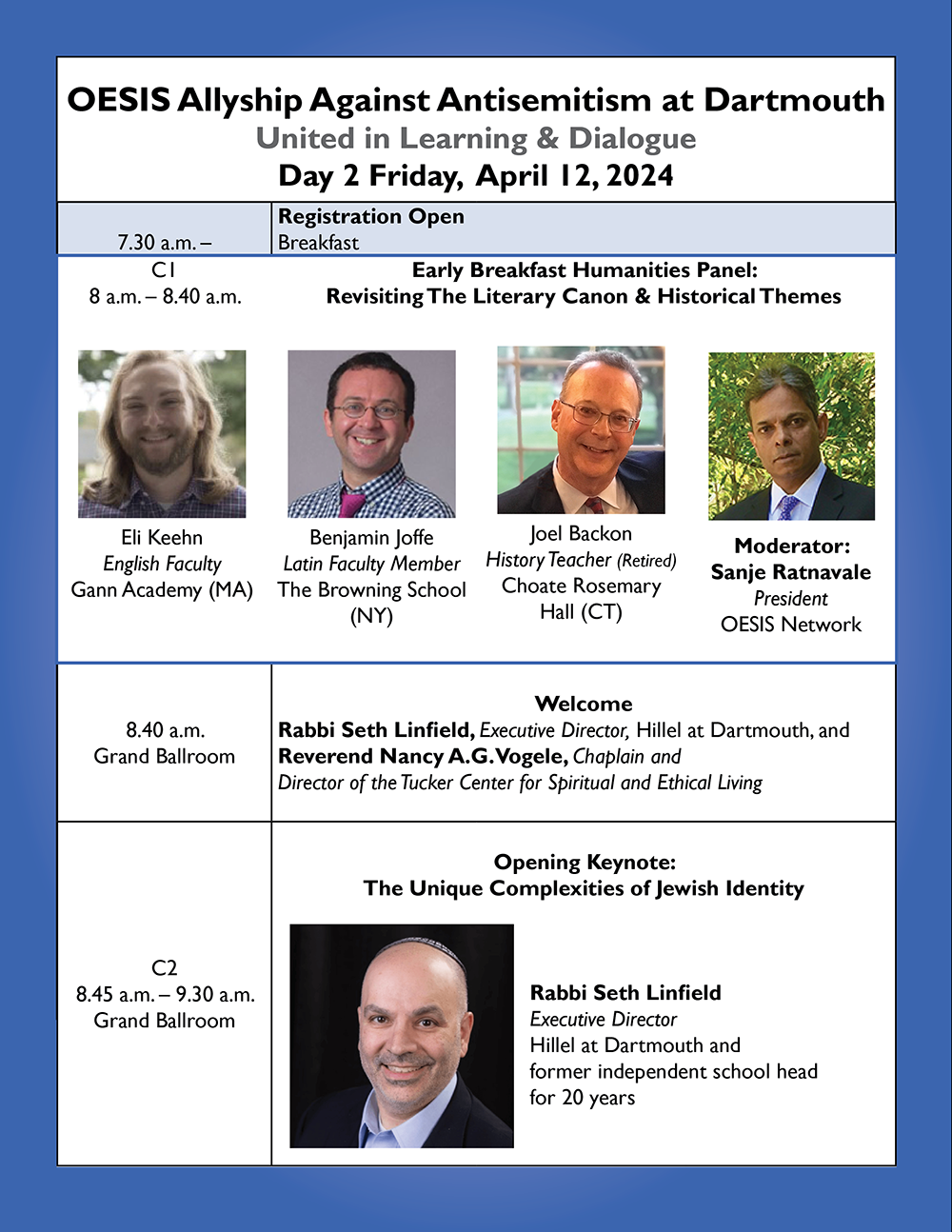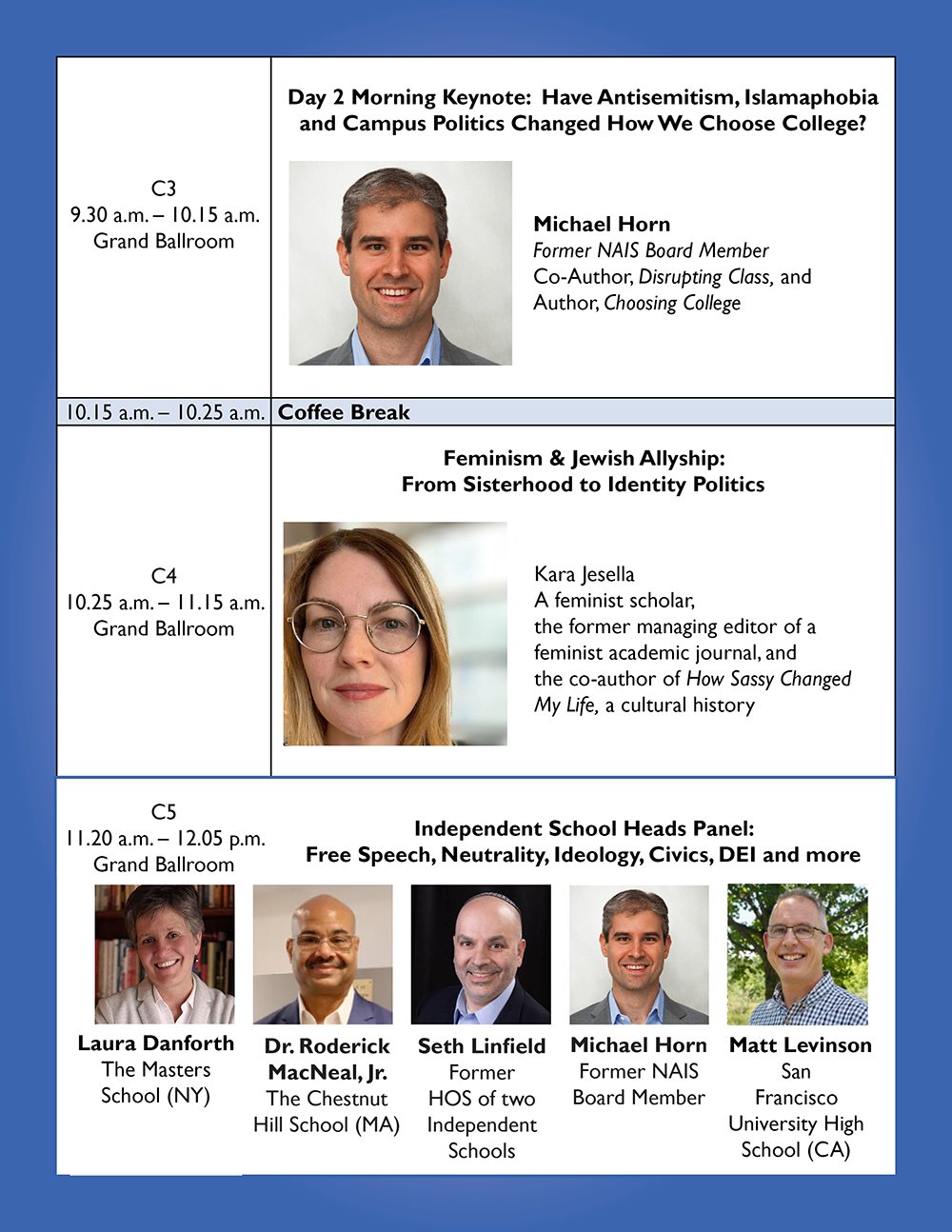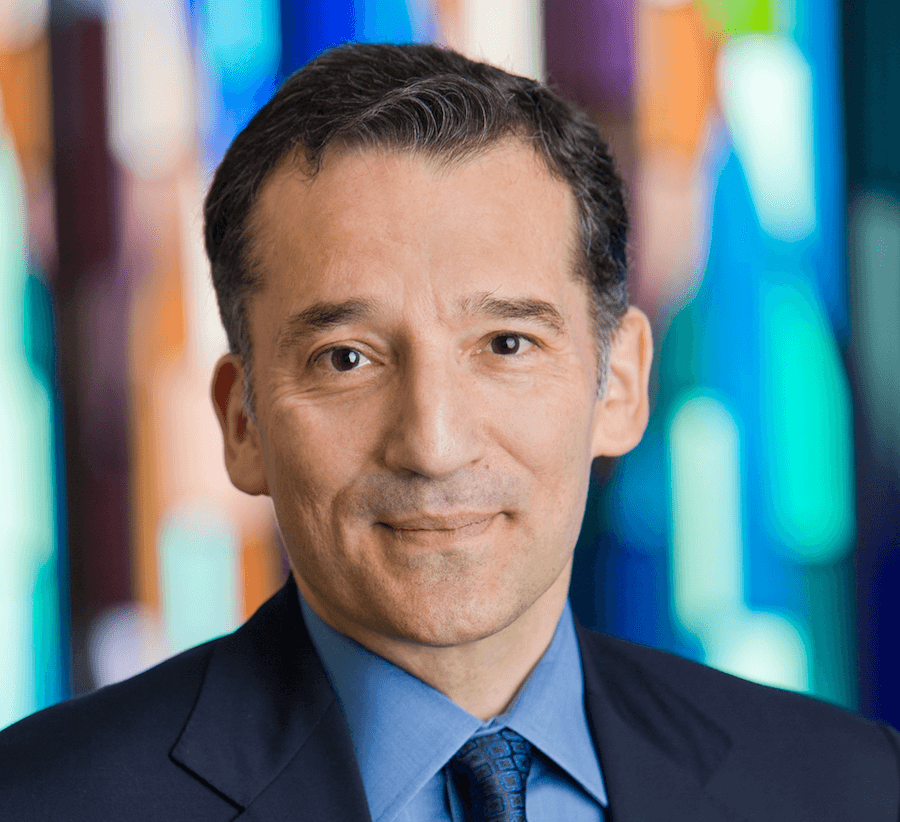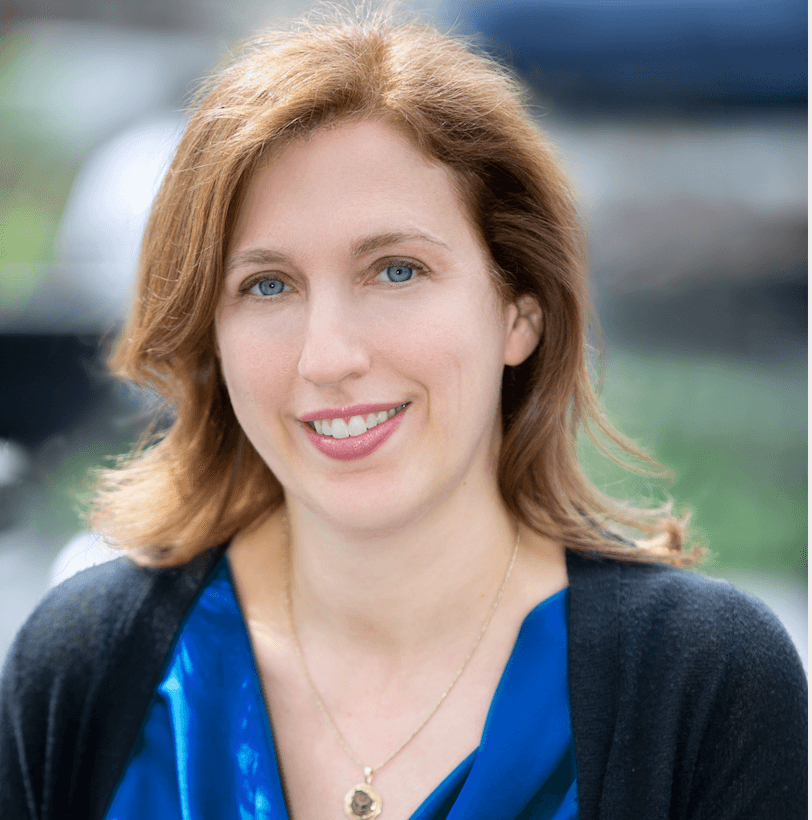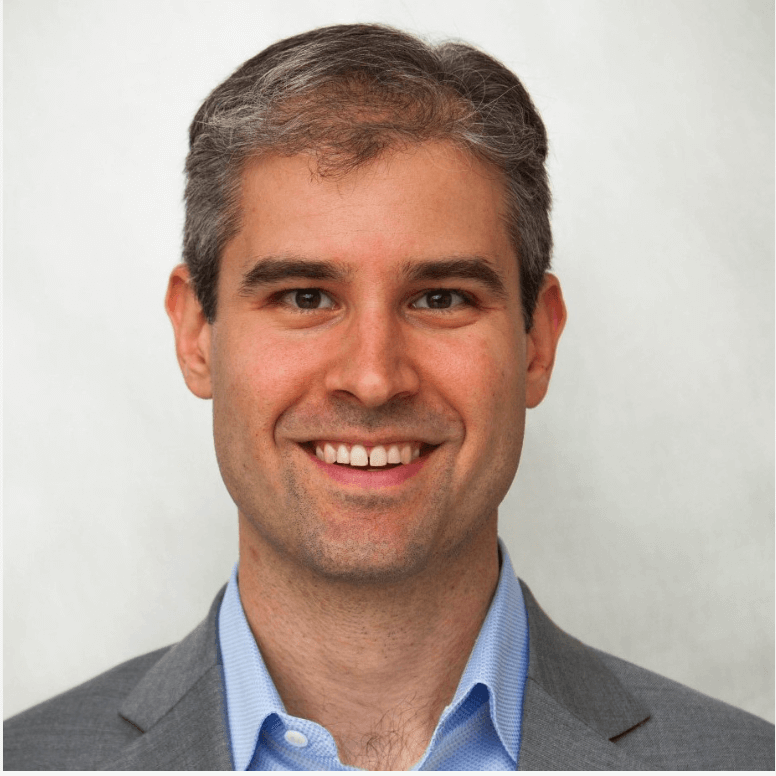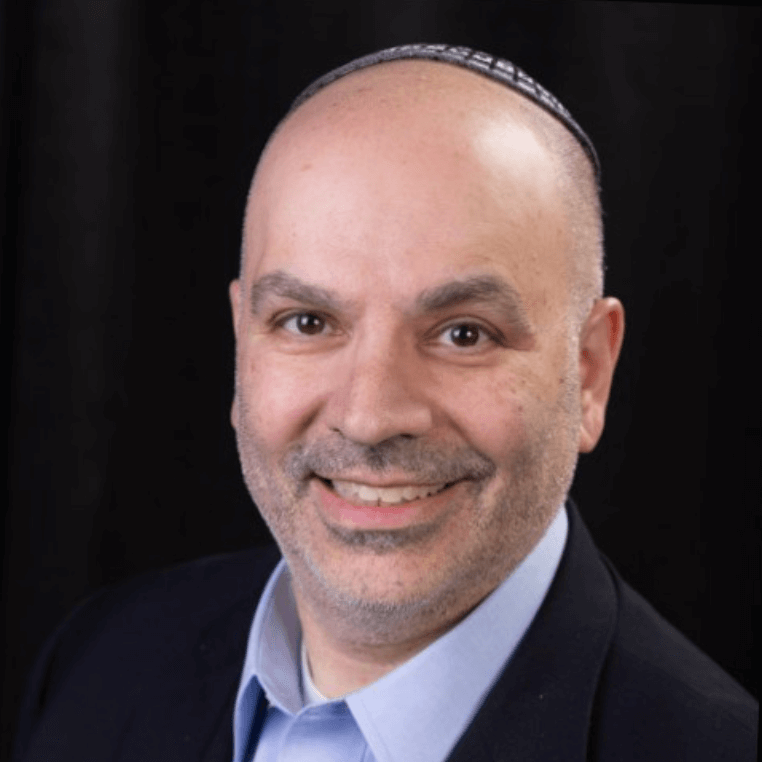We have recorded the whole conference and will release the 15+ hours of recordings as an OESIS Member School Cohort Summer Course starting in June. The course will be primarily asynchronous with 4 live Zooms for Questions & Discussions. Each course will last a month and must be completed during the time window. Please see quotes from some of the attendees and Register ABOVE.
"The presentations were fascinating (I’ve got 8 pages of notes) and the attendees were so engaged." Kara Jesella, Feminist Scholar & Speaker (NY)
"I enjoyed the conference tremendously, finding it inspiring, enlightening, and moving. This was by far the most comprehensive, thoughtful, and varied diversity conference that I have been exposed to. I found the discussions about Jewish identity to be particularly powerful, and I can easily imagine how those discussions will help me to formulate my approach to creating allyship at my school." Brandon Saltz, Upper School Science Teacher, Harvey School (NY)
"Thank you so much for the opportunity to connect with such a dedicated group of educators, and for your thoughtful and courageous leadership. The country needs you and the people you are preparing!" Dara Horn, Keynote Speaker
"This conference walked the walk much better than most, and consistently asked the participants to share observations and questions--which got well-informed, thoughtful responses. You had some really outstanding speakers who have really considered what they are seeing, where it is leading, how to change course--which won't happen fast but isn't impossible--and what the costs are to not doing so." Alexandra Schmidt, Math Instructor Emma Willard School (NY)
"OESIS said it would be a conference like no other, and I think you really delivered on that. I've never attended a conference for K-12 educators in independent schools focused on the topic of antisemitism, and really, more broadly, on the experience of being Jewish in independent schools. It really was a gift you gave all of us who attended, and I'm grateful for that. And I'm also inspired to lean into the work of supporting Jewish and non-Jewish students around the issues we raised more fully." Benjamin Joffe, Latin Teacher, Browning School (NY)
Our first OESIS Allyship Conference against Antisemitism will take place at the Grand Ballroom of the Hanover Inn on Thu, Apr 11- Fri, Apr 12 (after Easter and before Passover) in the heart of the Dartmouth College campus. The address of the Hanover Inn is 2 E Wheelock St, Hanover, NH 03755 (603) 643-4300. This conference is being held in collaboration with the Hillel at Dartmouth College, and its Executive Director, Rabbi Seth Linfield. The Conference starts at 8.30 a.m. with breakfast at 7.00 a.m. both days. Lunch is at 12.15 p.m. The conference ends on the 12th at 4.30 p.m.
Featured Speakers
|
Rabbi David Wolpe has been recognized as The Most Influential Rabbi in America by Newsweek and one of the 50 Most Influential Jews in the World. He is currently a Visiting Scholar at Harvard Divinity School and a Rabbinic Fellow with the ADL. Rabbi Wolpe serves as the Max Webb Emeritus Rabbi of Sinai Temple in Los Angeles and as a Senior Advisor to the Maimonides Fund. He is the bestselling author of eight books, and numerous articles in leading newspapers and journals. Rabbi Wolpe has previously taught at the Jewish Theological Seminary of America in New York, the American Jewish University in Los Angeles, Hunter College, Pepperdine, and UCLA. Rabbi Wolpe is a board member of the AJC’s Jewish-Muslim interfaith council, part of the Elijah interfaith consortium, and active in cross cultural learning throughout the world. He is the author of eight books, including the national bestseller Making Loss Matter: Creating Meaning in Difficult Times (Riverhead). His most recent book is titled David, the Divided Heart (Yale U Press), which was a finalist for the National Jewish Book Awards, and has been optioned for a movie by Warner Bros.
|
|
Dara Horn is the award-winning author of six books, including the novels In the Image (Norton 2002), The World to Come (Norton 2006), All Other Nights (Norton 2009), A Guide for the Perplexed (Norton 2013), and Eternal Life (Norton 2018), and the essay collection People Love Dead Jews (Norton 2021). One of Granta magazine’s Best Young American Novelists, she is the recipient of two National Jewish Book Awards, the Edward Lewis Wallant Award, the Harold U. Ribalow Award, and the Reform Judaism Fiction Prize, and she was a finalist for the JW Wingate Prize, the Simpson Family Literary Prize, and the Carnegie Medal for Excellence in Fiction. Her nonfiction work has appeared in The New York Times, The Wall Street Journal, The Washington Post, The Atlantic, Smithsonian, and The Jewish Review of Books, among many other publications, and she is a regular columnist for Tablet. Horn received her doctorate in Yiddish and Hebrew literature from Harvard University. She has taught courses in these subjects at Sarah Lawrence College and Yeshiva University, and has held the Gerald Weinstock Visiting Professorship in Jewish Studies at Harvard. She lives in New Jersey with her husband and four children.
|
|
Michael B. Horn is the author of several books, including the recently released From Reopen to Reinvent: (Re)creating School for Every Child; the award-winning Disrupting Class: How Disruptive Innovation Will Change the Way the World Learns; Blended: Using Disruptive Innovation to Improve Schools; Choosing College; and Goodnight Box, a children’s story. Michael is the co-founder of and a distinguished fellow at the Clayton Christensen Institute for Disruptive Innovation, a non-profit think tank, and teaches at the Harvard Graduate School of Education. He cohosts the top education podcasts Future U and Class Disrupted. He is a regular contributor to Forbes.com and writes the Substack newsletter The Future of Education. Michael also serves as an executive editor at Education Next, and his work has been featured in outlets such as The New York Times, The Washington Post, Th e Atlantic, Harvard Business Review, and NBC. Michael serves on the board and advisory boards of a range of education organizations, including Imagine Worldwide, Minerva University, and Guild Education, and is a venture partner at NextGen Venture Partners. Michael holds a BA in history from Yale University and an MBA from the Harvard Business School.
|
|
Rabbi Seth Linfield is the Executive Director of Hillel at Dartmouth. He was recently elected him to the Board of Directors of the Association for Chaplaincy and Spiritual Life in Higher Education (ACSLHE). Rabbi Seth received his undergraduate degree in mathematics from NYU, where he was elected to Phi Beta Kappa. He received his law degree from Stanford Law School. He is a doctoral candidate at USC’s Rossier Graduate School of Education. Rabbi Seth received his Rabbinic ordination from Kollel Tal Torah Yoka in New York. He was a member of the third cohort of the Day School Leadership Training Institute at the Jewish Theological Seminary in New York. This is Rabbi Seth’s third year at Dartmouth, following 19 years of heading K–12 schools. Rabbi Seth’s first career was as the partner in charge of the Technology Transactions Group at Barnes & Thornburg, an AmLaw 100 law firm. At the same time, he taught as an Adjunct Assistant Professor of Management at the Mendoza Graduate School of Business at Notre Dame. Rabbi Seth and Deana are the parents of seven children. |
We have been impressed by the level of dialogue among the various communities at Dartmouth. The leading Jewish newspaper, The Forward, commended Dartmouth: Many universities fumbled reactions to Hamas’ attack. Here’s how Dartmouth got it right.Two forums organized by professors from across the Middle East pushed thoughtful dialogue instead of protest.
Rabbi Seth extended this endorsement and invitation: "We eagerly anticipate advancing the conversation that Sanje jump started in the independent school world with his article on antisemitism through this symposium. These are trying times for our community globally and we appreciate the opportunity to combat the hatred we have faced for centuries with a commitment to better education. Our Hillel students and staff, and doubtless some of our faculty, look forward to joining you at the OESIS conference."
Set out below are some outcome prompts for the conference. Many educators in our current Jewish educator survey (see link below) expressed interest in presenting. Here then is the formal presenter submission link which is open to all (not limited to Jewish educators)- please complete as soon as possible and no later than December 20th.
Rabbi Seth extended this endorsement and invitation: "We eagerly anticipate advancing the conversation that Sanje jump started in the independent school world with his article on antisemitism through this symposium. These are trying times for our community globally and we appreciate the opportunity to combat the hatred we have faced for centuries with a commitment to better education. Our Hillel students and staff, and doubtless some of our faculty, look forward to joining you at the OESIS conference."
Set out below are some outcome prompts for the conference. Many educators in our current Jewish educator survey (see link below) expressed interest in presenting. Here then is the formal presenter submission link which is open to all (not limited to Jewish educators)- please complete as soon as possible and no later than December 20th.
- How can the K-12 curriculum better represent the history of antisemitism?
- How can DEI Programs be inclusive of combating all forms of bigotry, including antisemitism?
- What are the values, competencies and skills to become anti-antisemitic and more empathetic of victims of suffering, hatred and discrimination?
- What ideologies aid, underpin or undermine Jewish allyship?
- What might scholarly examination of systemic racism offer in the fight against anti-semitism?
- Have generational divides appeared over anti-semitism and if so, why?
- How does anti-semitism form and what are the origins of antisemitic tropes?
- Has Holocaust education had limited or effective impact?
- How can language and linguistic education have more of an impact on enabling empathy and combating hatred?
- What community supports can aid Jewish students?
- What is the role of social media in spreading antisemitism?
- What should be the limits of free speech and what are the boundaries of civility?
- What is the role of a school in condemning hatred?

